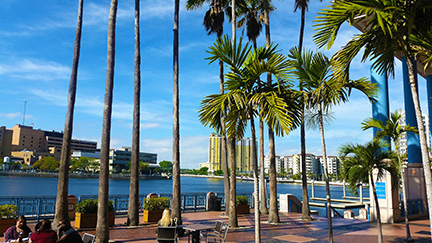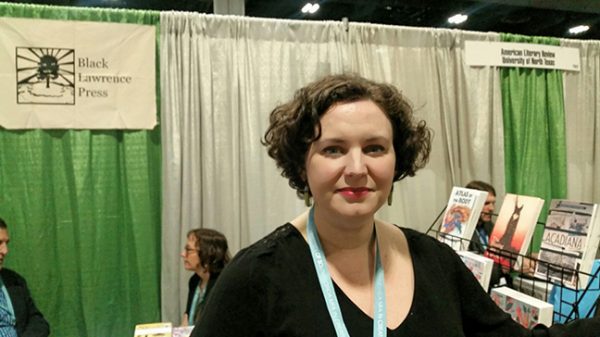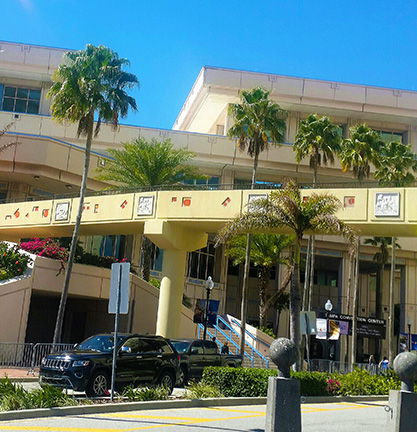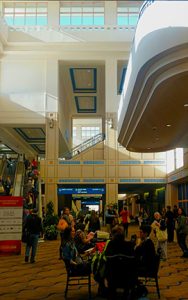I went to the Associated Writing Programs (AWP) Conference & Bookfair #18 in Tampa last week (March 8-10), expecting literary people, books, discussions, and fun in the sun. I wasn’t disappointed. Or only somewhat. Here’s my report.

AWP #18 in Tampa a limited success
The AWP Conference is the biggest writing and publishing conference-event of the year. In 2018, it was held in the gorgeous downtown Tampa Convention Center at water’s edge where the Hillsborough River meets Tampa Bay. The weather was cold, but sunny when the conference started on Thursday. About 12,000 writers, editors, literature/English/creative writing professors, and publishers attended.
I had a good, learning-filled time at the conference. I attended the daily yoga sessions offered on site. I visited the book fair, speaking with various internet-only friends whom I was glad to finally meet in person; I attended a number of “panels” or panel discussions.

Having coffee with my friend Diane Goettel of Black Lawrence Press, I learned how important book fairs like these are to smaller presses. She pointed out that at this convention there were so many small presses that a writer with a manuscript could fairly easily search among the presses at the book fair for one that was compatible.

I chatted with my poetry pal Victoria Dym, who was impressed by the “Spoken Word” panel she went to on performance poetry. I learned that her second book, When the Walls Cave In (Finishing Line Press 2017), was just published; she’d be reading from it during the conference.
I also attended a number of panels, including one on book reviewing and one on “crip lit” (a topic I want to explore in a future Cultural Weekly, so look for it).

By many measures, the AWP Conference was a success.
There was an important group of attendees, however, who felt forgotten. Those differently-abled, in wheelchairs, for example, found accessibility—and their own mobility—limited due to the layout of the conference site and hotel. For some, a lack of disability accommodations and overall non-accessibility threatened to spoil their conference experience.
Accessibility/accomodations at the conference

The Tampa Convention Center building is multilevel, ultra-modern-looking, and well-maintained. Unfortunately, the designers of the building didn’t seem to take access for the disabled into account. With its multiple stairways and elevators far from the conference rooms, obstacles to mobility for the disabled were evident, even to a non-physically disabled person like me.

There were also no disabled keynote speakers. There were no doors to the conference rooms with a handicapped push-button entrance. Written handouts are important to the hearing or cognitively impaired so they can follow the panel’s presentation; however, at many panels, there were no written handouts that mirrored the panel’s proposed discussions.

And for those non-able bodied writers staying at the recommended Tampa Marriot Waterside, there was a particularly frustrating and infuriating hell. The entrance to the hotel was on a side street. There was a hill to climb to get to the convention center. This made that one block walk not accessible for many physically disabled persons. Then, if someone had to take a shuttle from the Tampa Marriot Hotel to the Conference Center, there was only one shuttle van that was accessible, and it cost $8 to travel just one block. Next time, the AWP will have to look at transport from the recommended hotel to the conference location with a better eye to accessibility.
A sign of the time
AWP #18 Tampa really was a great conference—it’s just too bad the Tampa Convention Center wasn’t in sync with today’s ideas about how a conference deals with accessibility. The issue is a sign of the times. Next year’s conference is in Portland. I know—I hope—AWP is up to the challenge.
(All photos are by Mish. Website is mishmurphy.com)
[alert type=alert-white ]Please consider making a tax-deductible donation now so we can keep publishing strong creative voices.[/alert]
